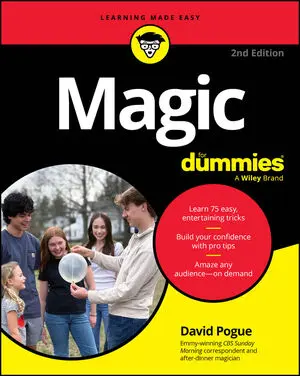This builtin is not currently supported: Animation
- Book & Article Categories

- Collections

- Custom Solutions
 Main Menu
Main MenuBook & Article Categories
 Main Menu
Main MenuBook & Article Categories
David Pogue
David Pogue is a six-time Emmy-winning “CBS Sunday Morning” correspondent, a New York Times bestselling author, and a former Broadway conductor and arranger.
Articles & Books From David Pogue
Develop the knowledge, skill, and showmanship you need to thrill audiences of all ages Magic For Dummies is your introduction to mystifying friends, family, and the world at large with the art of the magic. Emmy award-winning author David Pogue teaches you dozens of fun, inexpensive tricks that you can do with everyday objects like office supplies, clothing, food, and even your phone.
Cheat Sheet / Updated 09-22-2025
Learning and practicing magic is fun and challenging and to keep it as stress-free as possible be prepared to coolly answer questions about your tricks and make a quick recovery when a trick goes wrong. Know the different types of people in your audience so you can deal with their sometimes offbeat behavior and study some key words you will use repeatedly as you continue on your magic career.
Article / Updated 10-09-2023
The clarinet looks somewhat like an oboe, but it makes a very different sound in classical music: full, but without the edge of the oboe’s sound. One important reason for this difference is that, whereas the oboe has a double reed (a piece of shaved cane doubled over on itself), the clarinet has a single reed.
Article / Updated 09-28-2023
Chamber music is music originally written for a small group of instruments, to be played in someone’s living room (or “chamber”) instead of a concert hall. These days, you’re most likely to hear it in a small public venue — a university recital hall, perhaps, or maybe even a coffeehouse or subway platform. In general, any group of instruments that can play without a conductor is chamber music.
Article / Updated 09-28-2023
Let’s meet the Classical orchestra. It’s the big night: You show up at the concert hall. But holy smokes, there are almost 100 people up on that stage. Here’s what they’re playing:
Violin: The instrument is made of wood; the bow is made of horsehair; the four strings are made of metal; the sound is sweet, singing, and divine.
Article / Updated 09-28-2023
Despite stereotypes of old, long-haired, dead composers (and an even older audience), the art of creating classical music is still very much alive. Composers continue to write for soloists, chamber ensembles, and orchestras, and their works continue to carve new paths in the cultural landscape.But classical music in the 21st century differs from classical music of the 20th century in one important respect: It sounds less modern than the older music did.
Article / Updated 09-28-2023
Classical music notation be confusing. If you sit down at the piano and plunk out one of Ludwig van Beethoven’s incredible sonatas, you have only his written score to work from. The notes are all there, along with the rhythms and dynamics. However, it’s impossible to say how closely this written music mirrors the brilliant ideas in the composer’s head.
Article / Updated 10-06-2022
The orchestra world is a slowly evolving beast. At its heart, a classical concert is the same animal that your grandparents may recognize. However, the past two decades have seen developments that have brought the audience closer to the music. Here’s a look at what’s changed — and what’s not.
Identifying what’s new
First, much more new music is being performed, which is due primarily to one factor: new music is gorgeous again.
Cheat Sheet / Updated 02-23-2022
The world of classical music becomes quite a bit less mysterious when you know the names and functions of all the musical instruments, and a basic timeline of the music itself. This Cheat Sheet will help you discuss classical music with confidence.Meet the classical orchestraLet’s meet the Classical orchestra.
Classical music was never meant to be an art for snobs! In the 1700s and 1800s, classical music was popular music. People went to concerts with their friends, they brought snacks and drinks, and cheered right in the middle of the concert. Well, guess what? Three hundred years later, that music is just as catchy, thrilling, and emotional.





